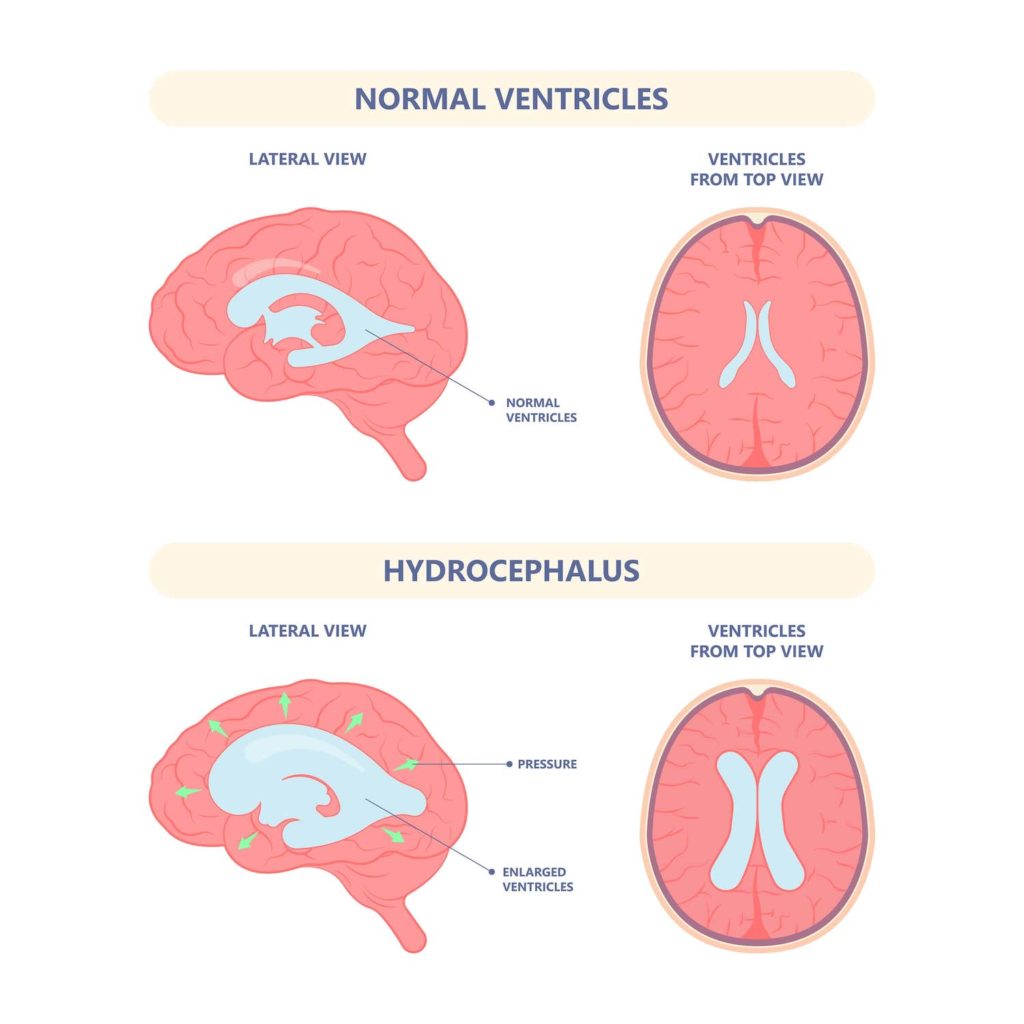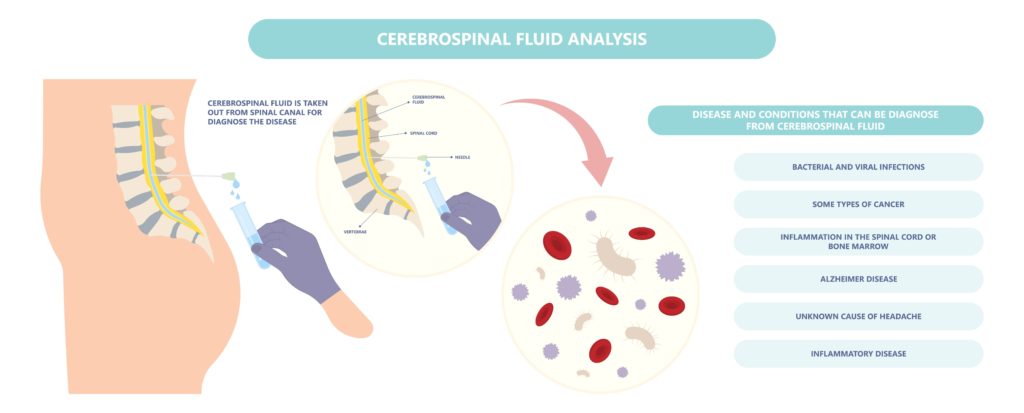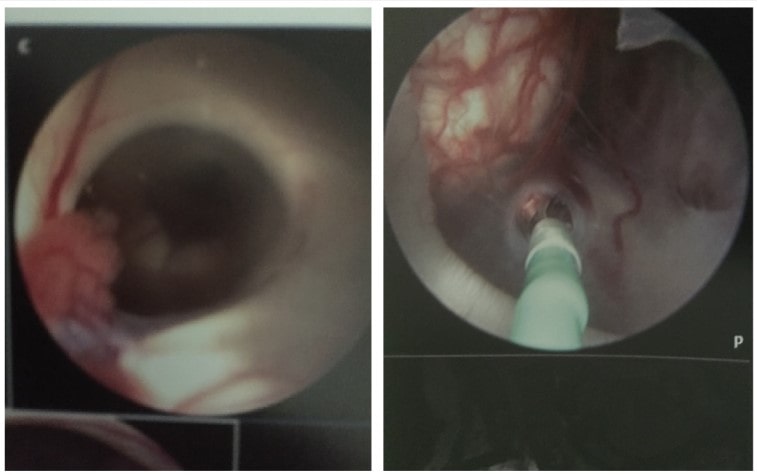Has this article been insightful? Share it!
Cerebrospinal fluid (CSF) disorders occur when there are abnormalities in the CSF composition, such as if the fluid accumulates in the brain or the spinal cord or if it leaks into other areas of the body. CSF leaking to the skull base, such as the nose or ear canals, can lead to medical complications, including infections. Treatment for these disorders can vary from simple bed rest and hydration to medication and surgeries, depending on the type of disorder and its present condition.
Cerebrospinal fluid – a clear, watery fluid present in the ventricles of the brain and spinal cord, plays a vital role in maintaining the health of your central nervous system (CNS). It performs several critical functions in the human body, including providing nutrition, cushioning the brain, absorbing shock for the CNS and removing cellular waste products. Confined within the CNS by the dura mater, a protective membrane, CSF is devoid of red blood cells and consists mainly of protein, glucose, electrolytes, antibodies, and white blood cells.
There are two main types of abnormalities in fluid dynamics that lead to cerebrospinal fluid disorders.
1. CSF pathway problem (obstruction of CSF pathways)
2. CSF production/absorption (communicative)

Hydro means “water,” and Cephalus means “brain and spinal cord.” Hydrocephalus, as the term implies, refers to an abnormal build-up of CSF in the cavities of the brain (ventricles). The extra fluids enlarge the ventricles, which in turn puts pressure on the brain. It is also associated with the abnormal flow, absorption, and production of CSF.
Excessive cerebrospinal fluid pressure can damage brain tissue and induce a variety of symptoms related to brain function. Although it can occur at any age, hydrocephalus is more common among infants and the elderly.
This type of hydrocephalus is a congenital disability or malformation in the brain that involves the build-up of CSF in the subarachnoid space or the obstruction of CSF pathways in the brain. Babies experience this shortly after birth. This increased intracranial pressure often manifests as a large head (Macrocephaly).
A Chiari malformation is another congenital disorder in which the lower part of the brain pushes down into the spinal canal. This blocks CSF outflow to the spinal canal and causes CSF accumulation, increasing pressure inside the brain.
The term “communicating” refers to the fact that CSF can still flow between the ventricles and into the spinal canal, which remains open. However, CSF absorption back into the venous circulation is blocked or disrupted, leading to CSF accumulation in the brain and pressure build-up. Communicating hydrocephalus is a common complication of traumatic brain injuries, meningitis, subarachnoid haemorrhage and tumours. Conversely, non-communicating hydrocephalus or obstructive hydrocephalus occurs when the flow of CSF is blocked along the passages connecting the ventricles.
Normal pressure hydrocephalus occurs over months due to abnormal CSF build-up in the brain’s cavities caused by age-related brain shrinkage among the elderly. There are no blockages or absorption issues in the brain or CSF pathways.
The significantly higher volume of CSF in the ventricles of the brain causes fluid to leak into the brain tissue along the ventricles, impairing various brain functions such as memory, leg movement, and bladder sphincter control. It is known as normal pressure hydrocephalus, as the pressure inside the ventricles is relatively normal or lower than normal in these patients.
NPH may be caused by subarachnoid haemorrhage, trauma, infection, a tumour or a surgical complication. However, it could also be idiopathic, which means that there is no identifiable reason.
Normal pressure hydrocephalus typically develops at an age over 70. Its symptoms often include recent memory loss, urinary dysfunction, and magnetic gait (inability to lift the feet off the ground).
CSF anomalies can affect your brain and spinal cord function, eventually leading to a coma or sudden death. This makes prompt diagnosis and treatment crucial.
Moreover, a sudden blockage of the CSF pathway with rising pressure inside the brain (raised ICP) can cause sudden death. Schedule an appointment with us if you experience any of the following symptoms:
Cerebrospinal fluid disorders can be idiopathic or secondary associated with CSF production, absorption, or pathway blockage.
During the first consultation, your doctor would ask various questions to get a better understanding of your condition, such as:
These inquiries will be followed by a physical examination and various diagnostic tests to ensure an accurate diagnosis.

In order to accurately understand and treat your condition, your doctor will typically run some tests, such as:
This involves a series of diagnostic tests to rule out any infectious diseases of the brain and spinal cord, tumours, autoimmune disorders, or bleeding in the brain.
CSF spectroscopy is a technique attributed to patients with subarachnoid haemorrhages. It detects bilirubin in CSF which is the constituent of blood.
Magnetic resonance imaging and CT scans help provide detailed images that reveal any structural abnormalities in the ventricles.
This diagnostic test involves collecting a sample of your cerebrospinal fluid to test for any infection, inflammatory condition, bleeding, or certain cancers as well as to measure the CSF pressure.
Manometers measure CSF pressure. Pressure-sensitive probes are used in nanometers to monitor intracranial pressure directly through the skull and put into the ventricles.
Nowadays, there are various treatments available to re-establish normal levels of CSF. Sometimes, a patient may require multiple procedures to treat hydrocephalus. Conversely, CSF leaks may heal on their own.
Treatment options largely depend on your current condition and the type of CSF disorder. These life-saving procedures often involve re-establishing CSF fluid circulation and absorption, either by removing the blockages or creating new pathways for the fluid to flow.
Some of these include medical or surgical treatment. Medical treatments serve as temporary measures to help lower pressure inside the brain or reduce CSF production. Surgical treatments are definitive procedures, and the options are:
It is a minimally invasive surgical procedure in which a small hole is made in the base of the 3rd ventricle to drain extra fluid from the brain to the basal cistern and lower the CSF pressure.

Cerebrospinal fluid disorders are mainly related to CSF metabolism. The conditions are caused by any anomaly in CSF metabolism, which leads to excessive production or reduced absorption. As they can be life-threatening at times, these conditions should be properly diagnosed and treated as soon as possible to prevent harmful outcomes. Whether you are seeking consultation regarding CSF disorder symptoms or brain tumour treatments, do not hesitate to reach out to us today!

Senior Consultant
Neuro & Spine Surgeon
MBBS, MSc Surgery, MRCS (Edin),
MMed. Sc (Gen Surg) (S'pore),
FRCS. Surgical Neurology (UK)
Dr Sein Lwin is an experienced Senior Consultant Neuro & Spine Surgeon and the Neurosurgical Director at the Advanced Brain and Spine Surgical Centre.
He is highly experienced in spine surgery and in minimally invasive approaches for spinal cord tumours and degenerative spine surgery. His specialised interests lie in endoscopic endonasal and open skull base surgery, pituitary tumours, vascular surgery, cranial nerve disorders and peripheral nerve conditions.
Many neurological conditions may require urgent attention. If you require immediate care, please contact us.
Contact Us For More Information
We provide quality specialised care for neuro and spine conditions.
For enquiries, leave a message and our friendly team will get in touch with you.
Monday – Friday: 9:00AM – 5:00PM
Saturday: 9:00AM – 12:30PM
Sunday & Public Holiday: Closed
We provide quality specialised care for neuro and spine conditions.
For enquiries, leave a message and our friendly team will get in touch with you.
Monday – Friday: 9:00AM – 5:00PM
Saturday: 9:00AM – 12:30PM
Sunday & Public Holiday: Closed
We provide quality specialised care for neuro and spine conditions.
For enquiries, leave a message and our friendly team will get in
touch with you.
Monday – Friday: 9AM – 1PM | 2PM – 5PM
Weekends & Public Holidays: CLOSED
© 2023 All Rights Reserved | Advanced Brain & Spine Surgical Centre | Terms & Conditions